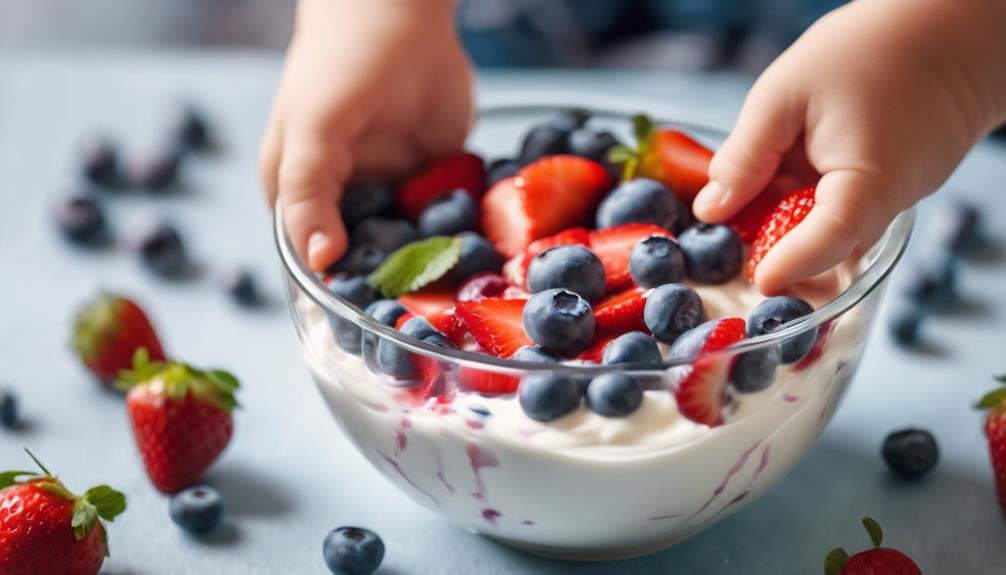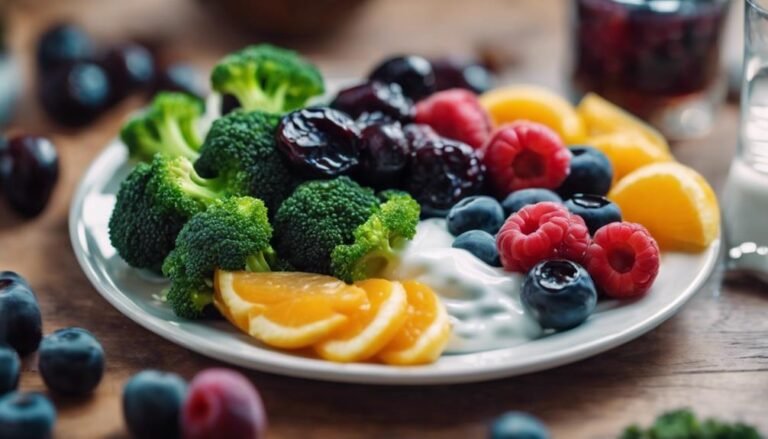Probiotics for Toddlers: Benefits and Top Sources
Did you know that the gut microbiome of toddlers is still developing and plays a crucial role in their overall health? Understanding the benefits of probiotics for toddlers is essential for ensuring their well-being. While you may have heard about the advantages of probiotics, have you ever wondered which are the top sources that can be easily included in your toddler's diet? Stay tuned to explore the benefits and discover the best sources of probiotics that will support your toddler's digestive health and boost their immunity.
Key Takeaways
- Probiotics support toddlers' developing immune system and maintain a balanced gut microbiome.
- They aid in digestion, nutrient absorption, and prevent growth of harmful pathogens.
- Probiotics reduce digestive discomfort, regulate bowel movements, and alleviate symptoms of constipation and diarrhea.
- They enhance the immune system, reduce the risk of infections like colds, and lower allergies incidence.
- Kefir is a beneficial source of diverse probiotic strains, enhancing nutrient absorption and supporting immune function.
Importance of Probiotics for Toddlers

Probiotics play a crucial role in supporting the developing immune system and overall health of toddlers. These beneficial bacteria help maintain a balanced gut microbiome, which is essential for proper digestion, absorption of nutrients, and immune function. By populating the gut with good bacteria, probiotics can help prevent the growth of harmful pathogens and strengthen the intestinal barrier, reducing the risk of infections and allergies in toddlers.
Research suggests that early childhood is a critical period for establishing a healthy gut microbiota, as it can impact long-term health outcomes. Introducing probiotics during this time can help shape a robust immune system and promote a healthy metabolism. Probiotics have also been linked to improvements in skin health, mood regulation, and even cognitive function in children.
Incorporating probiotic-rich foods like yogurt, kefir, and fermented vegetables into your toddler's diet can be a simple yet effective way to support their overall well-being. However, always consult with a healthcare provider before introducing any new supplements or probiotics to your child's routine.
Digestive Health Benefits
Enhance your toddler's digestive health with the support of beneficial bacteria found in probiotic-rich foods. Probiotics play a crucial role in maintaining a healthy balance of gut bacteria, aiding in digestion and nutrient absorption. By including probiotic foods in your toddler's diet, such as yogurt, kefir, and fermented vegetables, you can promote good digestive health.
Probiotics help regulate bowel movements, reduce digestive discomfort, and alleviate symptoms of conditions like constipation and diarrhea in toddlers. These beneficial bacteria also support the breakdown of food components, enhancing the absorption of essential nutrients vital for your toddler's growth and development.
Moreover, probiotics can help prevent or alleviate digestive issues commonly experienced by toddlers, such as bloating and gas. By incorporating probiotic-rich foods into your toddler's daily meals, you can support their overall digestive well-being. Remember, always consult with your pediatrician before making significant changes to your toddler's diet to ensure it aligns with their individual needs.
Immune System Support

Support your toddler's immune system with the help of beneficial bacteria found in probiotic-rich foods. Probiotics play a vital role in supporting a strong immune system in toddlers. These beneficial bacteria help regulate the immune response, enhancing the body's ability to fight off infections and illnesses. By including probiotic-rich foods in your toddler's diet, such as yogurt, kefir, sauerkraut, and miso, you can help promote a balanced and robust immune system.
Research suggests that probiotics can help reduce the risk of respiratory infections, such as the common cold, in toddlers. They may also help decrease the severity and duration of these infections when they do occur. Additionally, probiotics have been linked to a lower incidence of allergies and eczema in children, further highlighting their immune-boosting benefits.
Nutrient Absorption Enhancement
To maximize the benefits of probiotics for your toddler's health, consider how these beneficial bacteria can enhance the absorption of essential nutrients in their diet. Probiotics play a crucial role in supporting your toddler's digestive system, which in turn aids in the absorption of key nutrients necessary for their growth and development.
Here are three ways probiotics can enhance nutrient absorption for your toddler:
- Improved Gut Health: Probiotics help maintain a healthy balance of gut bacteria, which is essential for optimal nutrient absorption.
- Enhanced Absorption of Minerals: Certain strains of probiotics have been shown to improve the absorption of minerals like calcium, iron, and magnesium, which are vital for your toddler's bone health and overall growth.
- Better Digestion of Proteins: Probiotics assist in breaking down proteins into amino acids, making it easier for your toddler's body to absorb and utilize these essential building blocks for growth and repair.
Reduction of Digestive Issues

For toddlers, probiotics can assist in reducing digestive issues by promoting a balanced gut environment. Probiotics are beneficial bacteria that can help maintain the delicate balance of microorganisms in the gut, which is crucial for proper digestion and overall health. By supplementing with probiotics, toddlers may experience relief from common digestive problems such as constipation, diarrhea, bloating, and gas.
Research suggests that probiotics can help regulate bowel movements and improve the consistency of stools in toddlers, making digestion more efficient. Additionally, probiotics may reduce the severity and frequency of gastrointestinal infections by enhancing the immune response in the gut.
If your toddler struggles with digestive issues, incorporating probiotic-rich foods like yogurt, kefir, or fermented vegetables into their diet can be a simple and effective way to support their gut health. However, always consult with a healthcare provider before starting any new supplements or making significant changes to your child's diet.
Top Food Sources for Toddlers
When considering top food sources for toddlers, prioritize incorporating probiotic-rich options like yogurt, kefir, or fermented vegetables into their diet to support gut health.
- Yogurt: This dairy product is a well-known source of probiotics, containing live active cultures that promote a healthy gut microbiome in toddlers.
- Kefir: A fermented drink similar to yogurt, kefir offers a diverse range of probiotic strains that can benefit your toddler's digestion and overall well-being.
- Fermented Vegetables: Foods like sauerkraut, pickles, or kimchi are excellent non-dairy sources of probiotics that can be appealing to toddlers and contribute to a balanced gut flora.
These top food sources provide a natural and delicious way to introduce probiotics into your toddler's diet, aiding in the maintenance of a strong immune system and proper digestion. By including these options regularly, you can help support your child's overall health and well-being.
Yogurt for Probiotic Intake

Considering the benefits of incorporating yogurt into your toddler's diet for probiotic intake, this dairy product offers a convenient and effective way to support their gut health. Yogurt contains live and active cultures, such as Lactobacillus and Bifidobacterium, which are beneficial bacteria that can help maintain a healthy balance in your toddler's digestive system. These probiotics can aid in digestion, boost the immune system, and potentially reduce the risk of certain health issues.
When choosing yogurt for your toddler, opt for plain varieties with no added sugars to ensure they're getting the most health benefits. You can also mix in fresh fruits or a drizzle of honey for natural sweetness. Greek yogurt is a great option as it tends to have higher protein content compared to regular yogurt.
Including yogurt in your toddler's daily diet can be a simple way to introduce probiotics and promote their overall well-being. Be mindful of any dairy allergies or intolerances your child may have and consult with their healthcare provider if you have any concerns.
Kefir as a Probiotic Option
To explore another beneficial option for incorporating probiotics into your toddler's diet, consider introducing kefir as a source of gut-friendly bacteria. Kefir, a fermented milk drink similar to a thin yogurt, is a potent probiotic that can positively impact your child's digestive health. Here are three reasons why kefir can be a great addition to your toddler's diet:
- Diverse Probiotic Strains: Kefir contains a wide variety of probiotic strains, providing a more comprehensive range of beneficial bacteria for your toddler's gut compared to some other probiotic sources.
- Enhanced Nutrient Absorption: The probiotics in kefir can help improve your toddler's absorption of essential nutrients such as calcium, which is crucial for their growing bones and overall development.
- Supports Immune Function: By promoting a healthy balance of gut bacteria, kefir can help strengthen your toddler's immune system, potentially reducing the risk of common illnesses.
Consider incorporating kefir into your toddler's diet as a tasty and nutritious way to support their gut health and overall well-being.
Fermented Foods for Toddlers

Introducing fermented foods into your toddler's diet can provide a valuable source of beneficial bacteria that support their digestive health. Fermented foods undergo a process where natural bacteria feed on the sugars and starches in the food, creating lactic acid. This process not only preserves the food but also enhances its nutritional value. For toddlers, fermented foods can be a tasty and nutritious addition to their meals.
Some popular fermented foods suitable for toddlers include yogurt, kefir, sauerkraut, kimchi, and miso. These foods are rich in probiotics, which are live beneficial bacteria that can help maintain a healthy gut microbiome. When choosing fermented foods for your toddler, opt for varieties that are low in added sugars and preservatives.
Probiotic Supplements for Kids
Probiotic supplements can be a beneficial addition to your child's diet to support their overall gut health and immune system. These supplements come in various forms such as chewable tablets, powders, or liquids, making it easier for kids to consume. Here are three essential points to consider when choosing probiotic supplements for your little one:
- Consult a Healthcare Provider: Before starting your child on any probiotic supplement, it's crucial to consult with their healthcare provider. They can provide guidance on the right type of probiotic for your child's specific needs.
- Look for Strain Diversity: Opt for supplements that contain a variety of probiotic strains. Different strains offer different benefits, so a diverse mix can be more effective in promoting gut health.
- Check for Quality: When selecting a probiotic supplement, ensure it's from a reputable brand that conducts third-party testing for quality and potency. This step guarantees that you're giving your child a safe and effective product.
Frequently Asked Questions
Can Probiotics Help With Toddler's Skin Conditions Like Eczema?
Yes, probiotics can help with your toddler's skin conditions like eczema. Research suggests that probiotics can improve skin health by balancing the gut microbiome, reducing inflammation, and strengthening the skin barrier. Consider consulting a pediatrician for guidance.
Are There Any Probiotic-Rich Snacks That Toddlers Can Enjoy?
You'll be glad to know that numerous tasty snacks rich in probiotics can keep your toddler's tummy happy. Try yogurt with fruit, kefir smoothies, or fermented veggies. A study found that 70% of children enjoy probiotic snacks daily.
How Do Probiotics Impact a Toddler's Behavior and Mood?
Probiotics can positively impact your toddler's behavior and mood by promoting a healthy gut microbiome. Research suggests that a balanced gut can support emotional well-being and cognitive function. Including probiotic-rich foods in their diet may help.
Can Probiotics Help With Toddler's Dental Health and Cavities?
Yes, probiotics can positively impact your toddler's dental health by promoting a healthy balance of oral bacteria. This balance can help prevent cavities and support overall oral health. Incorporating probiotic-rich foods can be beneficial for your child's dental well-being.
Are There Specific Probiotic Strains More Beneficial for Toddlers?
When it comes to toddlers, specific probiotic strains like Lactobacillus rhamnosus and Bifidobacterium infantis are beneficial. These strains promote digestive health, boost immunity, and aid in nutrient absorption. Discuss with your pediatrician to find the best option for your child's well-being.
Conclusion
In conclusion, incorporating probiotics into your toddler's diet can have a significant impact on their digestive health, immune system, and overall well-being. By including probiotic-rich foods like yogurt, kefir, and fermented foods, you can help support a healthy gut flora and reduce the risk of digestive issues.
Consider adding probiotic supplements for an extra boost. Coincidentally, taking these simple steps can lead to a happier and healthier toddler.



